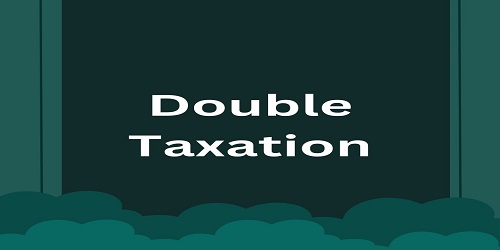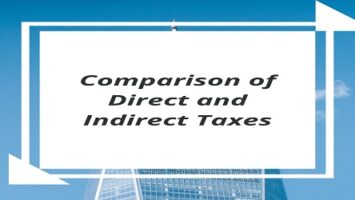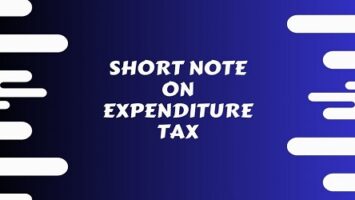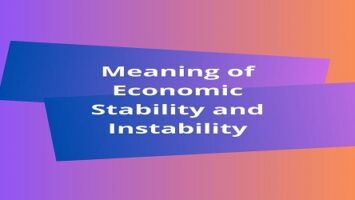Table of Contents
Meaning of Double Taxation:
A tax system that depends on a number of taxes is called a system of multiple taxes. It means that several kinds of taxes are imposed in the system of multiple taxations. Some taxes are levied on and paid by those who carry on certain professions or trades; others may be paid by property owners and yet others by those who purchase certain commodities, of course. These taxes are shifted and re-shifted and ultimately, their money burden and real burden and diffused over the society in one way or another. But in the first instance, these taxes are not paid by all the people.
Double taxation means when the taxing authority taxes the same base in more than one way. For instance, if the Satets levies a tax on income and another tax on expenditure, the same income (i.e., same base) is taxed twice. Suppose a man earns his income in the United States and England. If the government of both these countries taxes this man on his entire income, it becomes a case of double taxation of income. Since he pays the tax in two countries on the same income. Again, if the government of a country taxes the profits of a joint-stock company before, they are distributed and then taxes the individual shareholders on the dividends they get from this company. It is again a case of double taxation. Here, the company as well as the shareholders are taxed- it is the same thing that is taxed twice. Profits before distribution and profits after distribution are taxed. Hence, double taxation means, taxing the same thing twice. It does not mean taxation of the same man twice. Suppose, there is a man who has to pay two kinds of taxes, then it may not be the case of double taxation. Double taxation means the taxing of a person twice by one or two authorities in the same way, that is, on the same thing or taxing the same base twice.
All taxes or almost all taxes fall on income. But that does not mean that any two of them make a case for double taxation. For double taxation, it is required that they should be levied on the same thing or on the same tax base. It is not necessary for a case of double taxation that the two taxes should not be paid out of the same thing, i.e., income.
Another characteristic of double taxation is that the two taxes should have reference to the same period of time. For instance, the Government of the country taxes you on your income this year and again the next year. That does not constitute a case of double taxation, for it is not really the same income that is taxed twice. Hence, it is concluded that double taxation means taxation of the same thing twice either by the same authority or by different authorities.
Is Double Taxation Desirable?
Let us now analyze the desirability of double taxation in an economy. Generally, double taxation is not liked by taxpayers and even by economists. The reason is that double taxation does some injustice to the taxpayers. If everybody is taxed twice on the same thing and in the same way, it makes no difference. But, if one man has to pay tax twice on the same thing and another once, it discriminates against the first man. It does not conform to the principle of the ability to pay. Hence, it is said that in the case of double taxation, the tax system as a whole may not achieve equity between the tax-payers and, thus, it violates the principle of taxation. It should also be noted here that double taxation is condemned because it does some injustice to the taxpayer, otherwise double taxation has no fault in itself. Thus, Prof. J. K. Mehta said that “since double taxation involves inequity, we want to do away with it.”
Another possibility is that, though the tax system as a whole achieves equity, the tax burden may be too heavy due to double or multiple taxations. In such a case, it is objected from the point of view of the burden of taxation or its weight, but there is no defect from the point of view of the theory of taxation. The remedy lies in the reduction of taxation and expenditure to a level directed by the principle of public finance.
Forms of Double Taxation:
Double taxation can be placed into two broad categories:
(1) Double taxation caused by two competing authorities levying the tax on a person.
(2) Double taxation due to the same taxing authority taxing the same thing twice.
If there are two governments either within the same country or in different countries, and they both levy income tax on a person, then it becomes a case of double taxation by two competing authorities levying the tax. Double taxation due to the plurality of taxing authorities occurs either in a federation or between different independent countries. In either case, the problem is fundamentally the same though the solutions may not be similar. International double taxation arises partly because, it is in the national interest to exact taxes from foreigners, thereby increasing the national welfare at the expense of others, and partly because taxes are levied on the basis of origin as well as that of domicile. People whose income originates in one country and who are domiciled in another country, have to pay taxes to the governments of both countries. The tax burden on such incomes becomes heavier than on incomes that originate in the country where their owners are domiciled.
Thus, double taxation places an artificial impediment on the free flow of capital and other resources such as the services of technicians and experts, between the different countries. To put it in the words of Findlay Shirras, “Double taxation, thus, is a barrier which tends to keep capital within national frontier and to prevent it from flowing freely over such frontiers.” Hence such barriers are an obstacle to economic use of the world’s resources”. However, Professor Pigou is of the view that such barriers are in no way harmful to society. Thus, he says, “In so far as aggregate government expenses are really higher in respect of a man who resides in one country and earns or invests in another than in respect of one, all of whose activities are confined to the same country, such a barrier corresponds to the true cost, and is prima facie desirable from the standpoint of world’s welfare. It will be a strange coincidence that the burden of double taxation equals such true cost and in any case, the government never tries to tax foreigners only to the extent of such true cost.”
The other type of double taxation, namely, the one that is due to the same taxing authority or taxing the same thing twice. It should again be mentioned that taxing twice means taxing twice within the same unit of time. In this context, Professor Seligman has mentioned that there are three principal ways in which such double taxation arises. He pointed out that, double taxation arises when a company’s profit is taxed before distribution and then the shareholder’s dividend is taxed again. This kind of double taxation can be found in modern times. There is company tax and then the taxes on the distribution of profits. The profit is taxed before division at a fairly high rate and then the dividend received by the shareholders forms part of the total income which is subject to income tax. Thus, shareholders are first jointly taxed and then severally taxed. The same thing has been taxed before division and after division.
The second case of double taxation by the same authority may arise when debtors and creditors are both taxed on the amount of a loan. Here, the same man is not taxed twice, but the same money is taxed twice. It is said that it is twice taxed because it belongs to two persons and does some work for both. The owner gets interest on his loans and the borrower gets the use of it. Since it services two men and benefits both of them, hence it can be taxed twice.
The third case of double taxation may arise when both capital and income are taxed. There is a case of double taxation when a man’s capital is taxed and then the income arising from that capital is taxed. In this context, Professor Fisher said that income is derived from capital goods but the value of capital goods is derived from income. Thus, to tax capital is just to tax the expected income out of it. It is in this sense that it becomes a case of double taxation.
Besides, there are some who pointed out that income tax leads to double taxation on savings. Prof. J. S. Mill pointed out that in the case of a general income tax from which savings are not specifically exempted, savings are taxed twice as compared with income spent, which is taxed only once. Irving Fisher supported Mill’s theory of double taxation of savings. Professor Pigou also upholds the view set forth by Mill. In the words of Professor Pigou on income tax “differentiate against savings by striking savings both when they are made and also when they yield their fruits.”
Probable Solutions in Case of International Double Taxation:
The International Finance Conference held in Brussels in 1920 recommended that the League of Nations should try to solve the problem of double taxation at the International level. The conference urged that an internal understanding should be arrived at to avoid the imposition of double taxation which is at present an obstacle to the placing of investment abroad. The theoretical study of this question was entrusted by the Financial Committee of the League of Nations to four economists- M. Bruins, M. Einaudi, Seligman, and Sir Josiah Stamp. These experts come to the conclusion that double taxation arises because the taxing authorities levy taxes on more than one criterion, such as the political allegiance of the subject, his temporary or permanent residence, location or origin of wealth or income, place of spending, etc. In general, authorities wavered between two principles of domicile and origin. They recommended the adaptation of the more fundamental principle of economic allegiance, from which both the principles of domicile and origin emanate. They had, however, to admit that to allocate in the exact, proportion to economic allegiance to origin or domicile in each particular category is well-nigh impossible. The suggestion was, therefore, rejected by the Financial Committee of the League of Nations.
These expert economists also recommended that all the countries should agree to the mutual exemption of income flowing out to non-residents. This would mean no financial gain or loss to countries in whose case income is flowing out to non-residents. Since it would nearly balance the income accruing to its own residents in foreign countries. In the case of other countries, they recommended that the government of those countries would gain thereby. But the desire of governments to collect taxes from the residents of other countries makes the general acceptance of such a principle very difficult.
In June 1923, the Finance Committee of the League of Nations entrusted the work of studying the question of double taxation and tax evasion to a group of high officials of the fiscal administration of various countries, who submitted a series of Resolutions in Feb 1925.
Thereafter, the League of Nations appointed a Committee of technical experts on Double Taxation and Tax Evasion in 1927. It was asked to prepare draft conventions based on the resolutions of the high officials of fiscal administration of various countries. The Committee met in Geneva. Hence, it is also known as Geneva Convention. Their report was considered by the general meeting of government experts of various countries in 1928. The Draft convention recommended separate treatment for personal and impersonal taxes.
The personal tax should be levied by the State in which the tax-payer has his normal residence. In the case of impersonal taxes, income from immovable property, mortgages, public funds, bonds, loans and deposits, salaries, wages, or other remuneration should be taxed in the State of origin. Income from industrial, commercial, or agricultural undertakings should be taxed in the State where the persons controlling the undertakings have a permanent establishment.
The International Chamber of Commerce also considered the problem of double taxation. It was of the view, that double taxation can be avoided either by taxation according to residence alone or by taxation according to origin alone; but it recalls and endorses the views of economic experts of the League of Nations and of the Double Taxation Committee of the International Chamber that in general, the best method of eliminating double taxation is the adoption of the principle of residence.
However, the International Chamber of Commerce also recognizes the present difficulty of entirely eliminating the principle of origin from methods of solving the problem of double taxation mainly because a sudden change of nature might endanger the stability of budgets.
Hence, it is concluded that in order that the same income may not be taxed by both governments, it is necessary to devise some means by which the two governments may tax different parts of income earned by a man. Thus, a number of agreements on double taxation have been made between several countries. Either they tax different portions of income or give rebates to the people who are doubly taxed. The government of India made its first agreement on double taxation with Pakistan on December 10, 1947. The agreement covers taxes imposed by the India Income Tax Act of 1922, the Excess Profits Tax Act of 1940, and the Business Profit Tax Act of 1947. In this context, however, the International Chamber of Commerce recommends to the various governments that, while entering into bilateral conventions, the parties should adhere as closely as possible to the principle of residence.









Comments (No)